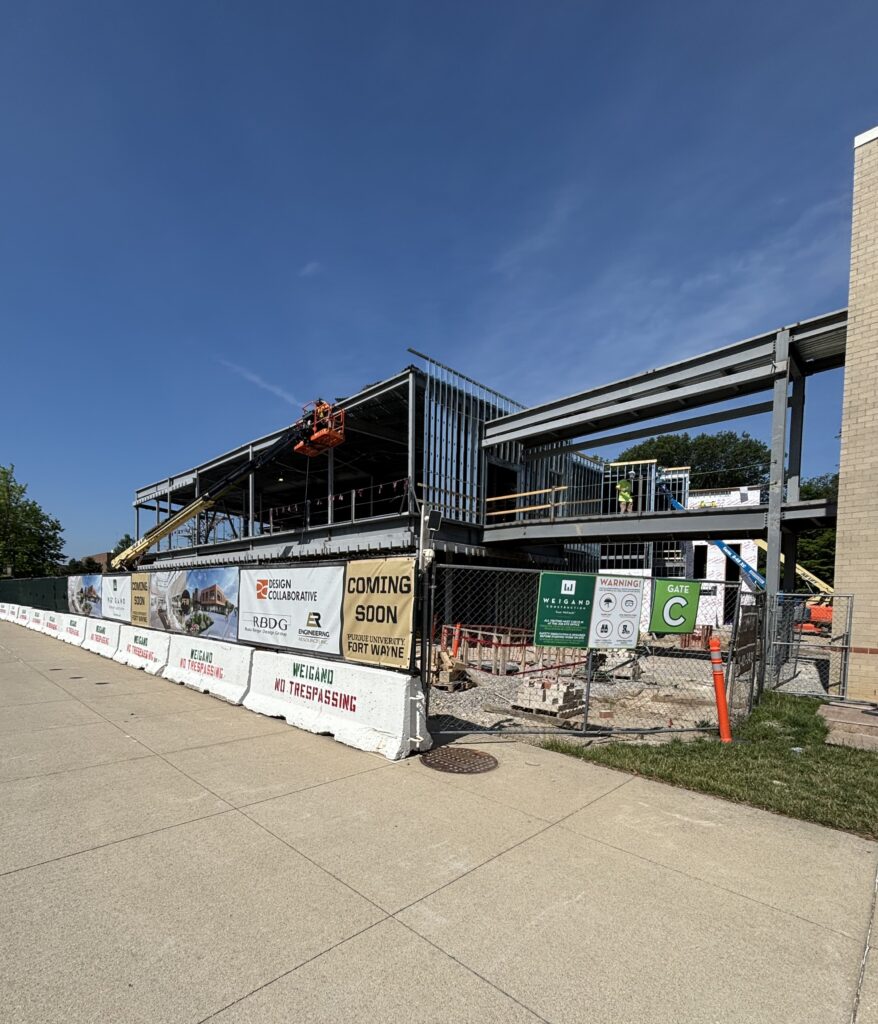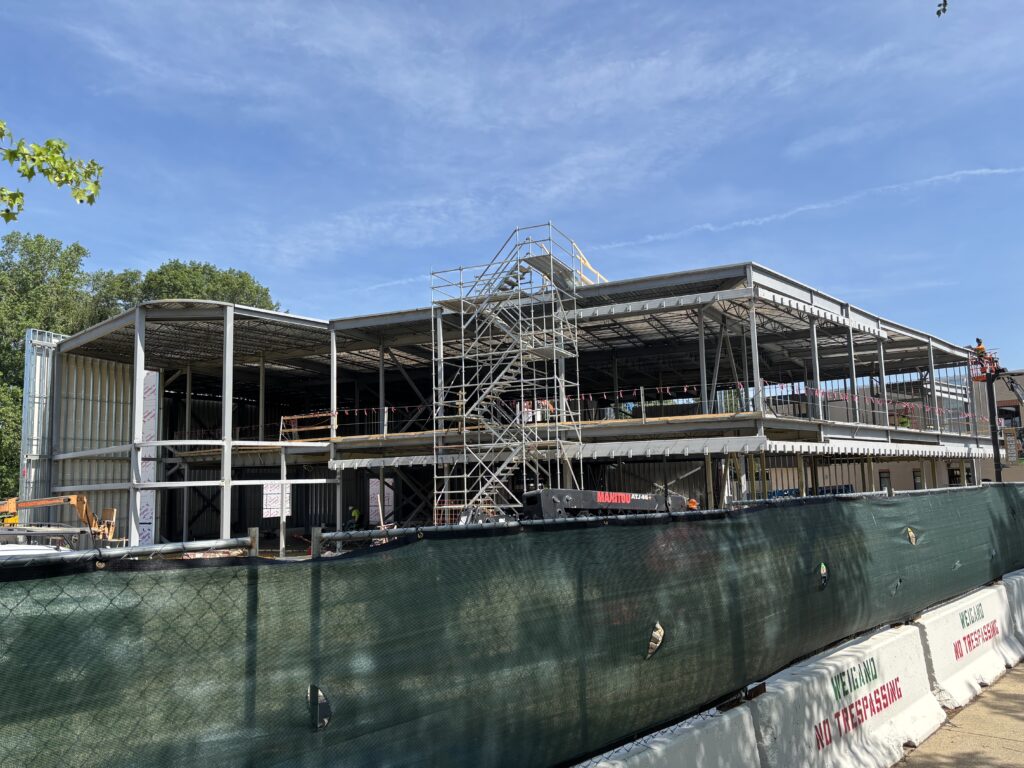By Andrew Danielson
2026. That is the year the new Surack-Sweetwater Music Industry Building is set to open.
At a cost of $25 million, the new building will house state-of-the art equipment and world-class facilities, offering students attending the PFW School of Music the chance to learn and study music making at a whole new level.
The new construction will be a staggering 26,000 square feet interconnected to the current Music Center via a skybridge. Packed into that space will be all kinds of technology designed for today’s commercial music needs.
Dr. John Buteyn, clinical assistant professor of music and director of popular music at PFW, said that the new building will contain three state-of-the art recording studios, analog and digital control consoles, and systems for surround and immersive audio.
The recording studios alone are high-end facilities, designed by the same engineers who planned the recording studios at Sweetwater, Russ Berger Design Group.
Dr. Jeremy Grall, director of the PFW School of Music, explained that the new facility will also include numerous editing suites, a large rehearsal room for PFW’s larger ensembles, an intimate “live” rehearsal room (which can hold potential live music concerts), a classroom, a conference room, and multiple offices for faculty.
Professor Buteyn explained that with the new building, space, and technology, PFW will have the ability to record in-house their various musical ensembles, stretching in size from their rock bands all the way to their major wind ensembles and orchestra.
The new structure is a testament to the exponential growth experienced by the School of Music.
PFW School of Music and Degree Programs are Born
John O’Connell, dean of the College of Visual and Performing Arts, explained that in the mid-2000s, PFW (then IPFW) offered a music technology concentration for students majoring in music and an outside field.
However, the program was quite small, with only a single room for students to practice their recording abilities and learn about music technology.
In 2018, PFW became its own entity, with their department of music elevated to become a School of Music. With that change came the opportunity to add new degree programs.
O’Connell said that they were looking for new ways to grow, and the fields of music technology and commercial music offered an exciting opportunity for expansion.
PFW added three new degrees in 2018-2019: music industry, popular music, and music technology.
But degree programs are only as effective as the opportunities they provide.
Thanks to the generosity of Chuck Surack, philanthropist and founder of Sweetwater Sound, PFW formed an agreement with Sweetwater that enabled the School of Music to begin offering new courses for its music majors at a facility on the grounds of Sweetwater called the “Purdue Fort Wayne Sweetwater Music Center” (SMC for short).
That facility contains industry-standard recording spaces and equipment, giving students the chance to learn on current gear used in the commercial music world.
But that was back in 2018.
Professor Buteyn explained that the SMC, though incredible with what it has to offer, has become too small for the growing student body in the school.
In 2018, there were 24 students in PFW’s music industry and commercial music degree programs. By 2019, that number had risen to 80 students, with the program nearly doubling in size to 147 students by 2022.
This growth is highly unusual for academic programs.
“It’s unheard of,” dean O’Connell said. “It’s really spectacular to have that much growth in that short of a time.”
The School of Music now has approximately 300 students, with about 50% of those students coming to PFW specifically for the new opportunities the music industry, music technology, and popular music degree programs offer.
With the growth the School of Music experienced came a welcome but still serious issue – how to host so many students with limited facilities. Class scheduling, and studio/editing time had become a challenge.
“Quite simply, we outgrew the facilities,” director Grall said.
The SMC is less than a third the size of what the new music industry building will be.


A Big Impact on Students and Their Education
One of the first impacts the school of music will experience with the new facility is that students among the various degree programs will get the chance to work together more closely.
Jake Kaufman, a PFW senior majoring in popular music with a focus in performance/song-writing, said that having the music industry building so close to the Music Center will open up collaboration opportunities.
Currently, students must leave the PFW campus and drive to the SMC in order to take their recording classes. They then have to drive back to PFW to take their other music courses.
But with the new building, that commuting will largely be a thing of the past.
“The best part about this is that the building [the new music industry building] is right there,” Kaufman pointed out.
Kaufman believes that the close proximity between the two music buildings will also help reduce perceived barriers between the commercial/pop music programs and the more traditional/conservatory-style programs.
“There seems to be some sort of separation between classical musicians and the commercial musicians,” Kaufman said. “That line need not exist. We are all musicians and we all should be working together.”
Professor Ryan Tilby, clinical assistant professor of recording at PFW, echoes Kaufman’s thoughts.
“Being all in one building is just going to help us realize that we all need to learn something from each other,” Tilby said. “I just want there to be one big community of people helping each other out all the time.”
One example of future collaboration will be the opportunities for commercial music students to practice recording both electrified as well as acoustical instruments.
Director Grall, who plays a variety of instruments, explained that recording acoustical instruments is actually more of a challenge than people might suppose.
With the new music industry building immediately adjacent to the music center, students will now have the opportunity to record a variety of acoustic and electric instruments, all while using world-class recording gear and techniques.
In the midst of all the excitement of the new facility, it’s easy to forget what makes a building spring to life.
“A building is just a place – it’s a thing,” Grall said. “The ‘thing’ that makes this work is the people.”
Grall went on to say that, thanks to the support of dean O’Connell, the professors, and the students, the building will have life and energy.
Kaufman shared that enthusiasm.
“We are definitely excited for it,” Kaufman said.
There are already plans in the works to add new course offerings for future music students at PFW. For now, the Surack-Sweetwater Music Industry Building is a blank canvas of opportunity awaiting the paint brush of creativity.
“The School of Music is going to keep growing,” director Grall said. “But we don’t even know how it’s going to grow yet, because there’s so many options.”





